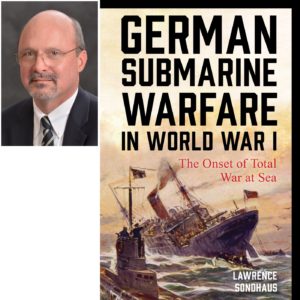Podcast: Play in new window | Download
Subscribe: RSS
 Dr. Lawrence Sondhaus is Professor of History at the University of Indianapolis. He has written numerous books about Naval warfare and about WWI with a focus on the Central Powers. I was able to interview him about his most recent book on German submarine warfare in WWI.
Dr. Lawrence Sondhaus is Professor of History at the University of Indianapolis. He has written numerous books about Naval warfare and about WWI with a focus on the Central Powers. I was able to interview him about his most recent book on German submarine warfare in WWI.
1:27 – Dr. Sondhaus talks about how he got into history writing about it. He was a child of the 60s. He had a particular interest in the Central Powers in WWI since he has a Croatian heritage.
3:39 – Dr. Sondhaus was asked to write a book on the Eastern Front in WWI but he suggested a book on German submarine warfare. He tends to study WWI from the perspective of the Central Powers which is uncommon among English writers on WWI.
5:20 – The Central Powers tended to take the lead in WWI with the Allies reacting and so WWI histories should focus on the Central Powers. He also focused on the German politics behind the war.
8:00 – Germans felt the U-boat blockade of Britain was equivalent to the British surface blockade of Germany. The Americans and the UK didn’t accept this. Also, German U-boat warfare in WWI was not as cruel as that of WWII. German U-boats applied cruiser rules.
11:20 – One German U-boat captain captured a number of merchantmen who became POWs for the duration of the war. However, submarines could not generally hold prisoners or tow them to land.
14:10 – Many German U-boat commanders felt they needed to be chivalrous. It was difficult for them to engage in unrestricted warfare because they were unable to be cruel. This was different from WWII.
16:13 – The Lusitania was not the main reason the US entered the war. It was shocking because of the number of people that died but the US took a long time afterwards to enter the war. It took many decades afterwards for the British to admit that the Lusitania was carrying munitions.
20:45 – When measuring cost to gain, the German WWI submarine was the most effective among the three great submarine warfare campaigns.
25:20 – Both sides used gas, submarines, bombed civilians, and other cruel methods, but the Germans are always the first ones to raise the stakes. This makes their image worse after they lose the war.
28:30 – Germans could not believe that their army did some of the cruel things they were accused of but it turned out they had. Germans were unified in support of the war once the Russians mobilized for war. Dr. Sondhaus highlights the feelings of one German politician, Erzberger, who worried that unrestricted submarine warfare would bring the US into the war. German opinion began to drift towards a negotiated peace during the war.
37:00 – Germany came close to winning the war but the Allied convoy system helped stop German success. The US and UK then used the convoy system in WWII.
41:05 – Dr. Sondhaus used British wreck divers maps to help do his research.
48:46 – The Germans suddenly lost their advantage in sinking ships in August 1918. Up until then they were doing well in this regard. But unrestricted warfare alone was not going to win the war for Germany.
49:57 – Dr. Sondhaus came across amazing stories of survival during submarine accidents and mishaps. There were sad stories about U-boat commanders trying to save enemy sailors.
55:02 – A lot of British historians don’t value US involvement in the war as important as other British efforts. This book adds weight to the importance of American involvement in the war.
1:00:25 – German WWI U-boat commanders went on to very interesting and different things after the war.
For more “Military History Inside Out” please follow me on Facebook at warscholar, on twitter at Warscholar, on youtube at warscholar1945 and on Instagram @crisalvarezswarscholar
Guests: Dr. Lawrence Sondhaus
Host: Cris Alvarez
Tags: military, history, military history, conflict, war, interview, non-fiction book, Germany, WWI, world war one, submarine, Britain, UK, U-boats, Italy
